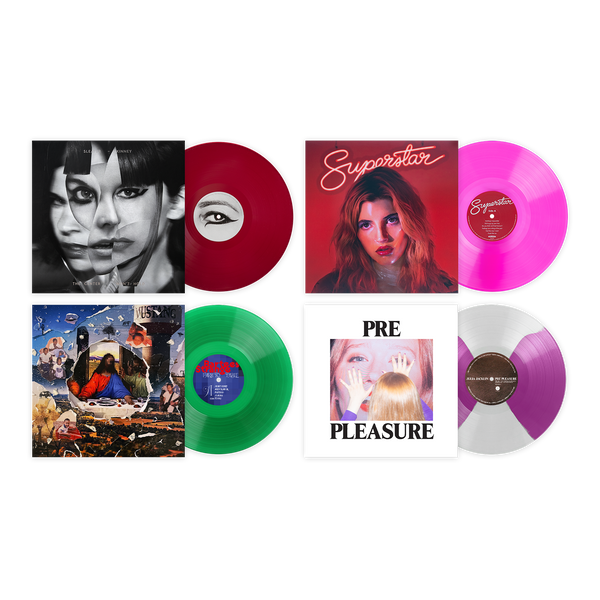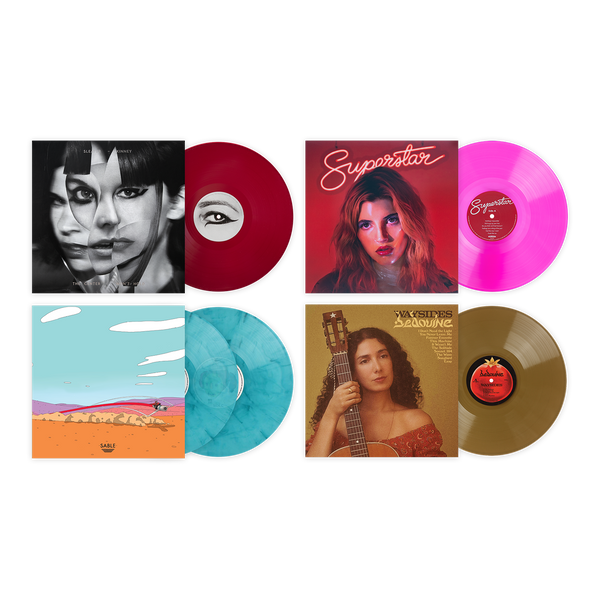ดาวเด่นเกิดขึ้น
ช่วงบ่ายในฮอลลีวูดกับ ‘ซูเปอร์สตาร์’ คาโรลีน โรส
ในช่วงบ่าย แคโรลีน โรส วัย 30 ปี ปรากฏตัวที่ Chateau Marmont แขกในคืนก่อนหน้านี้ก็น่าจะกำลังรับมือกับอาการเมาค้างที่สำคัญมาก อันที่จริงนอกจากการส่งเสียงของขบวนรถยนต์หรูที่ออกจากที่จอดรถ เสียงพัดลมตุ๊บตั๊บของภูมิทัศน์ราคาแพง และการเร่งรีบของเจ้าหน้าที่ที่สวมเครื่องแบบอย่างเรียบร้อย แถวบริเวณนั้นเป็นจุดเงียบสงบอย่างน่าตกใจขนาดใหญ๋ของ Sunset Boulevard วันนั้นคือวันหลังงานปาร์ตี้หลังการประกาศรางวัลออสการ์ของบียอนเซ่และเจย์-ซี และแคโรลีนเดินผ่านสถานที่เดียวกันที่ทิโมธี ชาลาเมต์และริฮานน่าเพิ่งผ่านมา แสดงให้เห็นว่าเธอดูค่อนข้างสับสนว่าจะได้รับอนุญาตให้เข้าไปในที่ดินนี้ได้อย่างไร เธออธิบายว่าแต่ก่อนเธอเคยพยายามเข้าไปที่ Chateau หลายครั้งแต่ไม่สำเร็จ ตอนที่เธอเข้าไป เธอใส่แดงตั้งแต่หัวจรดเท้า หิ้วกระเป๋าเดินทางอยู่ ยกเว้นเสื้อแจ็คเก็ตหนังสีดำ จากการพยายามแต่ละครั้งครั้งที่ผ่านมาเธอถูกบอกว่าเหมาะสำหรับ 'กิจกรรมส่วนตัว' เลยต้องถูกส่งจากไป
Superstar, Rose’s new LP, begins with its oddball protagonist getting an accidental phone call from the same glamorous Hollywood institution where we stood, which this protagonist takes as a divine signal to leave everything behind to be a star in a flash of blind ambition. “I knew it was my destiny, calling me from the Chateau Marmont lobby,” they proclaim on the dizzying opening track, “Nothing’s Impossible,” a maximalist, synth-driven burst of glittery sonic mania. The idea came to her following the relatively unexpected success and critical acclaim of her previous album, 2018’s Loner. As someone with a habit for letting her imagination play out in her head like a movie — a key part of her writing process, she notes — she thought about the random-number robo and telemarketer calls she’d been getting and envisioned a character, a “weirdo,” getting a call out of nowhere from such an institution, beckoning them into a life of Hollywood fame.
“I want them to get the sense that this person feels othered, which is kind of how I've always felt. I've always felt like I've never quite fit in anywhere. My peers, for instance, I don't know who they are,” she says and then laughs. I ask her if she means peers in a musical sense, and she confirms, adding that it echoes a vague outsider feeling she’s had her whole life. She interrogated this feeling to great lengths on Loner and revisits it again throughout the narrative on Superstar. Selling out venues filled with adoring fans throughout her last album cycle, while trying to figure out where she fit within the music industry, both proved to Rose what she was capable of and amplified a sense of otherness. The result is a massive, cinematic concept album, filled with a delicate balance of satire and earnestness.
“It had taken so fucking long for [Loner] to come out, and I'd just seen all these setbacks, by the time it came out, everything was just like a pleasant surprise. All the acclaim and people who fuckin' love it, it was just kind of a shocking surprise. And, when that was happening, it just kind of gets your mind going, like, what else can I do with really very few resources?” she explains. “That idea had just kind of sprouted in my brain and I was like, 'I've always wanted to do something bigger, I've always wanted to do stuff myself, why don't I just do it?' Like, fully just go for it and kind of dive into this.”
 This and above by Richard Edens
This and above by Richard Edens Throughout our afternoon at the Chateau, she’s unable to hide both her fascination and disdain for her excessive surroundings, referring to the hotel repeatedly as the “Sharteau Fartmont.” When we get scolded by an employee for unknowingly violating a hotel policy, I audibly stress over the sheer thought of getting kicked out of the Chateau. “That's like the whole premise of my album; this is all playing out in real-time,” she replies, adding in dry jest, “I planned all this. She's actually a plant.”
Caroline Rose has a relentless penchant for casually slipping into character work, putting on silly voices and, above all else, making herself laugh. When I slip out of the room for a few minutes during our interview, she puts on her best The Shining impression and whispers “Redrum…..Redrum” into the recorder I’d left rolling on the table, followed by a cackle to herself and a sweet “Just kidding!” all for me to find later. There’s a steady, often escalating, undercurrent of humor, regardless of the topic on which she’s speaking, and her passion for satire runs deeper than most — she recalls “crying laughing” the first time she read Voltaire’s Candide. But for all of the personality she carries around, she’s decisive and clear about what she wants, and there’s a faint, but intense solemnity that lacerates through the warm goofiness like an ice pick when she speaks about her career.
“If you are a person who wants to do stuff, period, you wanna do stuff — if someone doesn't understand that, cut them. You have to have this cutthroat mentality if you really wanna live your dream life. And I've always been that type of person: If you have a dream life for yourself, fuckin' die trying, you know? Just try. Try as hard as you can, because there's joy to be had, I think, in the journey of trying.”
While Caroline’s explicit that the anti-hero of her album isn’t entirely made in her own image, they are infused with a blown-up caricature of the most “undesirable” qualities she sees in herself. On the break-neck track “Got to Go My Own Way,” we see them bidding farewell to their life and cutting out everything in the way of their dreams in between grandiose proclamations of their new fame-filled L.A. life, complete with weekends in Paris and Fiji. When the intoxicatingly groovy bass line cuts out, they ask, “Remember when we wanted all of the same things? To settle down and hyphen both of our last names? That’s dead and gone, so now it’s time to save face.”
Just like the delusionally brazen lead of the album, when it comes to both her vocals and production, Caroline absolutely went for it. As a result, you’d be hard pressed to find an album that’s this much unadulterated fun to listen to — you can literally hear her having a good time making it. There’s no synth sound too silly nor guitar to gaudy, nor percussion to poppy, to be on Superstar, all bolstering its thematic daydream backdrop of what it would be like to live in ultimate excess. Caroline recalls being a young child and lying that her family had a Porsche, thinking it would make others respect her.
“Regardless of your socioeconomic background, I think every person who grows up in this country secretly is fascinated by, and taught, that we would be the most valuable if we were rich and famous,” she explains. “We're taught this as little kids. And it's just interesting because it follows us into adulthood and it's just fascinating. I don't think any life is like better than another, it's just different. Like, you have one; everything's kind of a give and a take.”
 Richard Edens
Richard Edens Writing a narrative so deeply cinematic in nature, Caroline cites films like The Bitter Tears of Petra Von Kant, Mulholland Drive, and Drop Dead Gorgeous as inspirations that “penetrated [her] psyche in a way that [Superstar] really captured.” While a theatrical four-act ’70s german film, a David Lynch neo-noir mystery, and a mockumentary beloved by early-aughts teen girls may belong in vastly different spheres of genre, they all share varying degrees of cult following, an untouchable eeriness, twisted romance, and explosive downward spiraling brought on by violent, unshakable ambition or fixation. And much like the collection of films it was inspired by, the confidant fire in the belly of Superstar’s narrative inevitably sours.
On the anxious “Do You Think We’ll Last Forever?” we’re introduced to a romantic storyline that permeates the rest of the album. While it’s reminiscent of a sexy Prince hit, the heavy breathing throughout the track could serve as a Rorschach test for intense love or a full-blown panic attack, but ultimately it doesn’t matter; there isn’t a notable difference. By the end of it, the roller coaster derails into a euphoric explosion of nervous pleas: “Tell me that you want me ’cause I’ve got to admit / if you’re with someone else I don’t think I could exist.”
“One of the things I was really focusing on is what we do, what we sacrifice in order to find success,” she explains. “I'm fascinated by my own behavior. And now I'm in a relationship where I don't really want to sacrifice anything from my relationship, because I'm really happy, and it's like one of those things where you have these really human reminders of what real joy feels like, and it doesn't really come from a career or, I don't know, anything superficial, it's like those foundational reminders that relationships matter.”
 Richard Edens
Richard Edens The most tender moment on the album and, oddly, the most poignant love song I’ve heard in quite some time, is the S&M-infused ballad “Freak Like Me,” which features a soft trip-hop beat straight from heaven and gorgeous, cascading piano sample from Aaron Embry’s “Raven’s Song.” Even amongst the power dynamics and the Xanax-handcuff-vomit-combat boot imagery, it boils down the fundamental core of love: being seen for everything you are, and seeing in return.
With tumultuous, newfound love at odds with unshakeable ambition — and ambition not panning out to all it was cracked up to be — insatiable determination and naked confidence turn into dark reckoning. “Command Z,” a numb, existential gulp of a song, a portrait of a person forced to examine their own delicate humanity. And “Back At the Beginning,” serves as an escapist fantasy we’ve likely all had more than once: what choices would you make if you could start over?
“A struggle that people will always kind of find themselves in is how much time and how many sacrifices do I make for a person? And how many sacrifices and how much time do I give to my career and my goals in life? Like, I wanna be somebody, I wanna have value, I wanna leave something behind for my kids, or for other people. And, human value is this endless question. Like, what makes us valuable? Is it relationships? Is it money? Is it some sort of craft that we are making for other people? Is it how many lives we touch?,” She asks. “I wanted it to feel as though this person was cutting out anybody who doesn't believe in them, and is going after a dream, but then is really disappointed by the dream and has some regrets, and then at the end, you're kind of left being like, "Well, did I make the right choice, or did I not?" And you don't really know. And I don't really know, because I'm still kind of in it. I'm still figuring out if I'm making the right choices or not.
Amileah Sutliff เป็นนักเขียน บรรณาธิการ และผู้ผลิตสร้างสรรค์ที่ตั้งอยู่ในนิวยอร์ก และเป็นบรรณาธิการของหนังสือ The Best Record Stores in the United States.
Related Articles
เข้าร่วมชมรม!
เข้าร่วมตอนนี้ เริ่มต้นที่ 44 ดอลลาร์ส่วนลดพิเศษ 15% สำหรับ คุณครู,นักเรียน,ทหาร,ผู้เชี่ยวชาญด้านการดูแลสุขภาพ และ ผู้ตอบโต้เหตุฉุกเฉิน - ยืนยันตัวตนเลย!







